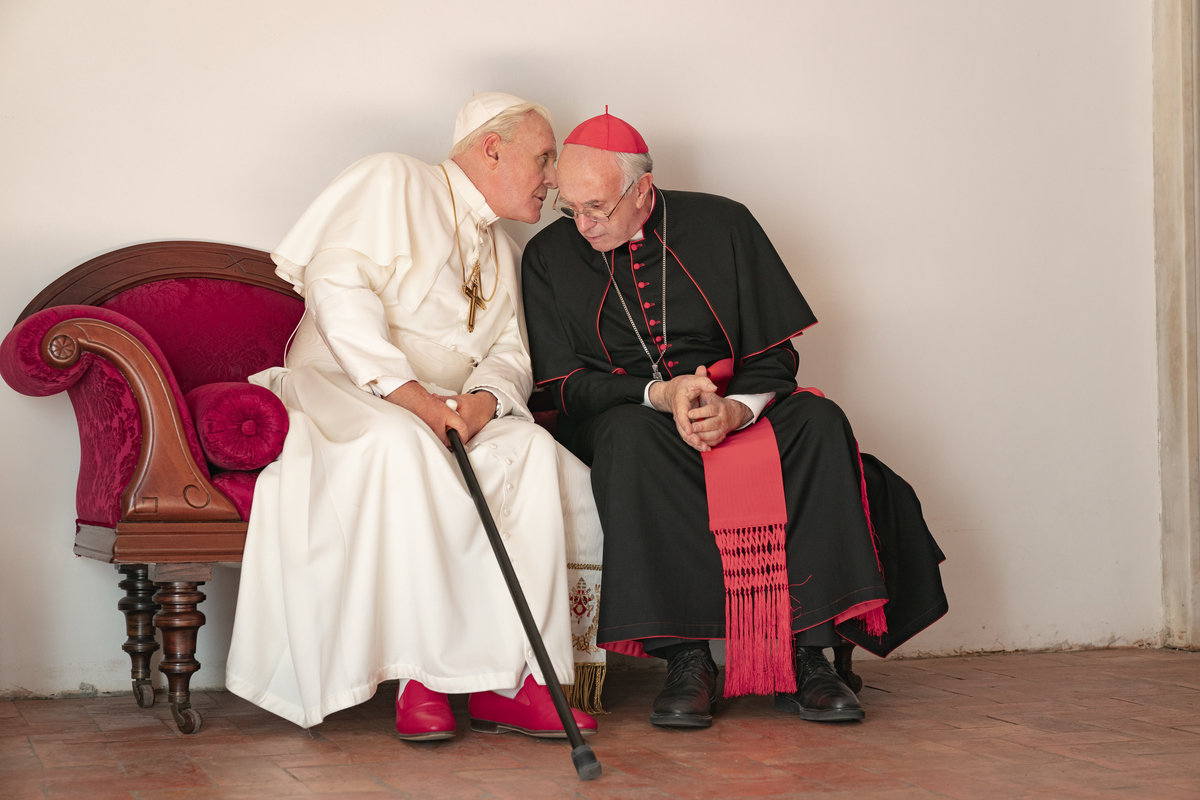

The Two Popes is a film that’s difficult to discuss with equanimity because it sticks a finger right into the centre of wounds that divide many Christians.
Juxtaposing contrastive approaches to certain high-profile problems that have plagued the Catholic Church in the last half-century, the emphasis of this fiction is arguably more political than theological, less balanced than one-sided, and for these reasons more intellectually stimulating than spiritually satisfying.
The upcoming Netflix release centres upon a protracted conversation between the two most recent Roman Pontiffs. The then-Cardinal Jorge Bergoglio (latterly Pope Francis) travels to Rome intending to tender his resignation to Pope Benedict (formerly Cardinal Joseph Ratzinger). The pair talk as they stroll the gardens of Castel Gandolfo and the aisles of the Sistine Chapel, expressing perspectives emblematic of very different approaches to contemporary problems taken up by various Catholics.
Cardinal Bergoglio is undoubtedly the film’s centre of sympathy. Whistling pop tunes by Abba, eating pizza from a street vendor, and enthusiastically cheering on his native Argentinian football club at the noisy corner bar, he is presented as the approachable, down-to-earth, affable figure consistently celebrated in many news outlets.
By contrast, Pope Benedict is portrayed much less likeably. His conversation with Bergoglio is abrupt, authoritarian, and, as the dialogue continues, seemingly culpably out of touch with major movements in the wider world. He mentions the Beatles like an arcane discovery, eats alone, and confesses to the sin of having hidden away in his books, too afraid to engage with “life.”
From this you might be able to anticipate the film’s overall perspective – or what a less sympathetic audience member might call its bias.
This fictionalized Benedict interprets Bergoglio’s wish to resign as an act of protest against the Church establishment, yet Bergoglio prevaricates and points toward the reforms he thinks long overdue. And while the film never makes the exact content of these reforms crystal clear, the drift would seem to be toward those well-known hot-button controversies like homosexuality, women in leadership, and Communion for the ecclesially married yet civilly divorced.
In other words, Bergoglio is interpreted here as an advocate for the social agenda generally supported by “liberals” and much of the secular media. Benedict, by contrast, is presented as the arch-conservative and reactionary, concerned more with strengthening the walls that make up the house of the Church than with tearing down walls to let more people in.
Some might sympathize wholeheartedly with one approach or the other. For my part, the stalemate provoked by adopting either of these positions is not only counterproductive, it presupposes a mistake: specifically, what we might call a false dichotomy between mercy and the truth.
The popular appeal of Pope Francis’ pontificate for many Catholics and non-Catholics alike, I think, is premised upon the perception that here at last is a Pope “like us.” He chooses not to live in a palace, takes the bus, cooks for himself, tangos once a week, and in so doing supplies a vivid image of the God who draws near to us in Jesus Christ. In him we see a shepherd who is not afraid to smell like the sheep.
The general perception of his predecessor tends toward the opposite: Benedict XVI seemed to many to speak from the insulated recesses of an ivory tower, pronouncing sophisticated sentiments, strange tastes, and difficult, intolerant-sounding teachings. This was a man, it seemed, from a different world, one who did not so much stoop down to meet us as demand we climb up somewhere higher.
However, this, too, is a characteristic of Our Lord.
There is no problem with personally preferring one approach – that of Francis or that of Benedict – over the other. But there is a problem with isolating out a predominant character trait of either and calling it the entirety of Christianity.
If you’re not convinced about this, crack open your New Testament and take another look at the figure at its centre. See if mercy gets unhinged from the truth, or acceptance anywhere uncoupled from the call to repentance. In Jesus Christ, love meets us where we are but does not leave us there.
So while The Two Popes does offer its audience an insightful story well told, it ultimately does not satisfy for failing to probe deeper than the real yet relatively superficial problems it identifies.
Politics, personalities, and personal preferences do continue to divide Christians, but a distinctively Christian approach to reconciliation will never be based merely upon discovering common ground in pop songs, pizza, and World Cup rivalries, however much these everyday connections might ease the way.
Rather, what must suffuse all of this neighbourliness, if it is to be truly Christian, is that mysterious character of love that not only holds in tension all legitimate differences but also calls us to radical change.
(Originally published in The B.C. Catholic)
